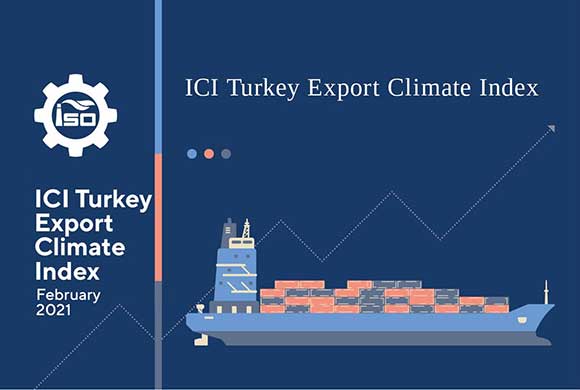ICI Türkiye Export Climate Index for February Released
- 08.03.2021
- News

Measuring the operation conditions in the key export markets of the Turkish manufacturing sector, the Istanbul Chamber of Industry (ICI) Türkiye Export Climate Index rose back above the 50.0 no-change mark in February, posting 51.5. The reading signalled a modest improvement in demand conditions in export markets, and one that was the most marked since September last year.
The US was the principal driver of the improving export climate in February. Output increased at a substantial pace, and one that was even faster than the near six-year high seen in January. Germany posted a slight increase in overall activity during February despite strong growth in the manufacturing sector. A number of other eurozone nations saw a positive manufacturing performance. Russia posted an expansion of output for the second month. China posted a slowdown in growth, while Saudi Arabia, the UAE and Qatar all posted continued expansions in output.
The Istanbul Chamber of Industry (ICI) Türkiye Export Climate Index, which measures the operation conditions in the key export markets of the Turkish manufacturing sector, announced the results of the index for February 2021. In the index, the figures above the 50.0 no-change mark signals an improvement in the export climate, while the figures below signals disruption.
The ICI Türkiye Export Climate Index rose back above the 50.0 no-change mark in February, posting 51.5 from 49.9 in January. The last survey signalled a modest improvement in demand conditions in export markets, and one that was the most marked since September last year.
Accounting for around 6% of Turkish manufacturing exports, the US was the principal driver of the improving export climate. The US output increased at a substantial pace, and one that was even faster than the near six-year high seen in January. Germany, which is the largest single destination for Turkish manufacturing exports, posted a slight increase in overall activity during February despite strong growth in the manufacturing sector. The rise was the weakest in eight months as the COVID-19 pandemic and associated restrictions continued to impact operations in services. A number of other eurozone nations saw a positive manufacturing performance, as highlighted by strong output growth in the Netherlands and Austria. Other key European markets meanwhile saw further weakness in demand amid the COVID-19 pandemic. The UK saw unchanged output volumes, although this followed a substantial decline in the previous month. A modest increase in output was seen in Italy, but France and Spain registered decreases.
Expansion of output in Russia, slowdown in growth in China
In February, Russia posted an expansion of output for the second month. There were varied trends across the rest of the BRIC nations. India registered a sharp and accelerated expansion in activity. China posted a slowdown in growth, while Brazil saw a slight decline in output. There were also differing results in the Middle East in February. Saudi Arabia, the UAE and Qatar all posted continued expansions in output, but ongoing declines were signalled in Egypt and Lebanon. Parts of Asia recorded strong growth, with Taiwan, Singapore and South Korea among the best performers globally. On the other hand, political instability in Myanmar resulted in a substantial fall in manufacturing output there.
Commenting on the Istanbul Chamber of Industry Türkiye Export Climate Index, Andrew Harker, Economics Director, IHS Markit, said: “The improvement in export demand conditions in February hopefully marks the start of a more positive period for Turkish manufacturing exporters, as COVID-19 vaccine roll-outs around the world start to see a return to normality. There are likely to be further bumps along the road, however, with restrictions and supply-chain disruption continuing to limit growth prospects in the near-term.”